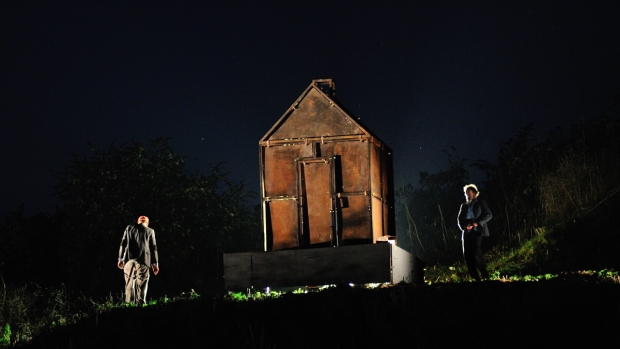Blue Remembered Hills at Greenwich+Docklands International Festival – review
Dennis Potter’s play returns

© Doug Southall
One of the aims of the ambitious Greenwich+Docklands International Festival is to open up unusual sites in the area for outdoor performances. This expansive vision reaps rich fruit here with a version of Dennis Potter's melancholic study of childhood that is set in a hidden – and normally restricted – location in the middle of the Thamesmead Waterfront.
Potter's play – first seen on TV in 1979 – is set in the Forest of Dean, the idyll of the writer's own childhood. Its brilliant notion was to cast adult actors as children, thus turning its depictions of the pleasures and cruelties of their games into a meditation on lost innocence and memory. Their actions – mimicking the behaviour of their unseen parents, falling into familiar patterns of bullying and retreat – both reflect the adult world as they know it and pre-figure the people they will become.
It's a terrific piece and it gains enormously from being set within this wild and beautiful landscape, surrounded by trees and with a great hill in the centre. At the top, there's a barn which will be the setting of the play's shattering conclusion. Even the planes passing overhead are co-opted to represent the planes of the war which the children are living through, feeling its effects, reducing its life and death struggle to fit into their play, making sound effects and silly jokes of a conflict that is shaping their lives. The fact that the site was actually used for testing armaments in the Second World War adds another layer of resonance.
The production comes courtesy of the Belgian collective de Roovers, and they manipulate the setting magnificently, racing down the hill, running into the trees, balancing on the debris with which the children play. Their separation from the nuance of Potter's England is obvious not only in their struggle with the Forest of Dean dialect but in the fact that Stef Stessel's costumes are more stylish (and with longer trousers) than the average English schoolboy of the time might wear.
Nevertheless, they catch the characters of the children, the way that power ebbs and flows among the group, the constant need to be tough, to be big, even when they might be feeling vulnerable and sad. They capture too the terrible dynamic that means that whenever a child is feeling doubtful, they react by turning against the most vulnerable of the group – the abused and lonely Donald.
Donald's story, revealed in glimpses, is almost unbearable: his mother hits him with a poker, his father is missing, a Japanese prisoner of war. However, he's not just a victim, but a foul-mouthed manipulator as well. He is the heart of the piece, and the problem with the production is that the very openness of the staging means that his tragic narrative gets lost.
The barn on the mound looks amazing, as Donald and the cowardly Philip take the first steps on a path that will lead to disaster, with the dark blue of the sky and the rich red of the building picked out by Bert Vermeulen's lighting. There's a sense in which these tiny figures seem entirely at the mercy of fate. But the detail of dialogue and relationship is lost; emotions are, rather than released.
As a result, although this is a memorable production, it's not a moving one.












